£2 per single journey seems OK - BUT ...
The Mirror seemed to think it was for ix months. WRONG : it is due to run from January to March.
POSSiBLY!
Another periodical illustrated the "bonanza" with a picture of a London bus - but the scheme will not apply in London where the flat fare (with Oyster or other magic plastic) is already below £2.
Julian Peddle had much to say about the "deal" in his column in Buses magazine. fbb has looked more widely.
One article elsewhere suggested that passengers would be saving £5 a day.
Doubtful. If the average single bus fare is £2.80, the cap is not the bonanza the press seems to think it is.
Sheffield Supertram explains the consequences rather better than most. (click on the graphic to enlarge it)
Even with the cap, a two leg journey out followed by a two leg journey back would still cost £8; hardly an incentive to encourage "commuters" to turn from their more expensive but more convenient car to the bus.
So sales of day, weekly and monthly tickets might be lower, as buying capped fares each day could be cheaper - see Supertram, above.
An article in the on-line version of Route One magazine is uneasy about the practicalities of the scheme.
fbb has already shown his readers how complicated it is for bus operators; and so, with a little over two weeks to go before its all kicks off in January 2023, there is generally a deafening silence from individual bus companies.
Are they still doing their sums?
Have they decided to join this complicated and financially risky offer. It is a voluntary scheme.
Is three months enough to make a difference?
Is the difference big enough to attract thousands of new passengers?
Anyway, here is a selection of thoughts from Route one.
Bus operators that have already declared an interest in participating in the Bus Fare Cap Grant (BFCG) look set to be offered a fixed funding allocation in early December, before they need to confirm whether they will take part.
So if a bus company gets their sums wrong, there will be no extra cash? Hmmm?
Consultancy firm EY UK has been engaged by DfT to collect the data necessary to calculate allocations, which will be capped at £20m for each of the three months in question.
Consultants - horrors!
The draft BFCG guidance is understood to state that if a loss is made by an operator while in receipt of the funding, DfT will not make up the gap. It is also permitted for an operator to return a profit when participating, routeone has been told.
Complicated means of calculation in play
Calculation of the sum to be offered to each operator is complex. It will be carried out via a four-stage process that first uses a baselining exercise to calculate average revenue loss per ticket.
A subsequent forecasting of BFCG take-up will utilise a recovery rate prediction. A seasonality adjustment will also be applied, as will elements relating to service level adjustments, inflation and a generation factor to reflect expected growth in demand. All that data will be used to calculate a funding allocation.
It has been suggested that SME operators will be able to complete a simplified baselining process. The calculation method for all prospective participants includes an adjustment that allows for passengers having switched from other tickets to the capped £2 fare.
Yes - all very clear, DaFT.
When it announced the cap in September, DfT said that one of the scheme’s purposes will be to “subsidise operator costs.” Now that the draft guidance has been issued it is not clear how that will happen.
A short video smuggled out of a bus HQ in Aberdeen shows a chubby bus manager in conversation with a faceless minion from the DaFT.
Of course, operators might be more enthusiastic for the scheme if they had access to data from Cornwall's cut fare policy funded (expensively) by HMG.
In its press release launching the £2 fare cap, DaFT refers excitedly to the "pilot scheme" in Cornwall.
A flat-rate bus pilot scheme, backed by £23.5 million of government funding, launched in Cornwall this January and has already seen an indicative 10% increase in passenger numbers. The ‘Any Ticket Any Bus’ scheme, running over 4 years, includes a £3 day ticket within towns or a £9 day ticket across all of Cornwall, which is valid across different bus operators.
Not quite, DaFT!
The Cornwall scheme is not "flat fare" It has brought a reduction in all fares of about 30%
fbb does not really know what an "indicative" 10% increase in passengers means, but it sounds like a euphemism for a guess!
Let's do the sums.
10 people travel on Arthur Daley's bus into town paying £6 each return. That's £60 in the piggy bank.
Fares are reduced by 33.333 (recurring!)%. Passenger numbers increase by 10%.
11 people travel on Arthur Daley's bus into town paying £4 each return. That's £44 in the piggy bank.
HMG needs to fund the operator an extra £16. The operator may already be in receipt of payments if it is a tendered service.
Hss the scheme worked? Maybe? But at those rates, will the operators be keen to keep the fares low when the "pilot scheme" ends.
Of course not - far too risky.
And how does the £2 flat fare fit in anyway?
And how are things going in those Metro-Mayor controlled ares where a different set of funding has provided a similar flat fare scheme already?
Does anyone know? Are they telling?
And PLEASE DON'T ASK this question!!!
How does the reimbursement work if your delighted passenger is buying a £2 flat fare from Matlock (the national scheme) through to Sheffield (The South Yorkshire Mayor's Fares scheme)? They are funded differently.
Who pays the bill and how does Stagecoach get its money back for the X17.
Ir Or it Gold now?Or has it turned Motorway Maintenance yellow?
Whatever, it runs from Matlock to Sheffield via Chesterfield ...
... and onwards off the map north to Barnsley.
It is a jolly good ride for £2, whoever actually pays for it!
Which reminds fbb. Are holders of "old fogey" cards re-imbursed as usual or do they become part of the £2 cheme?
Below, a picture of a bus manager happily discussing his finances with the DaFT ...
... and the Men from the Ministry ready with all the answers.
Good show, old bean?================================
Advent Calendar Day 16
Pertinent Parables
One of the most reliable and helpful documents that supports the stories of Jesus was called by German Scholars "die Quelle" which means "spring" or "source" in the sense of a source of water. This was, the clever people say, a list of what Jesus said rather than what he did - his actual words were considered so important.
Sadly the document no longer exists; but the egg-heads aver that its existence explains why the sayings and teachings of Jesus are so similar in the three different "Synoptic" gospels (Matthew, Mark and Luke).
So we know that Jesus taught those who followed him, those who listened, not with lengthy sermons (Church preachers please note) but with short pithy anecdotes which we now call Parables.
"So why doesn't God just get rid of all the evil in the world if he is God?", is a taunt often made to believers.
Usually such complainers want God to get rid of other people's sins, not their own!
Well Jesus had an App (a Parable) for that!
The Kingdom of heaven is like this. A man sowed good seed in his field.
One night, when everyone was asleep, an enemy came and sowed weeds among the wheat and went away.
When the plants grew and the heads of grain began to form, then the weeds showed up.
The man's servants came to him and said, "Sir, it was good seed you sowed in your field; where did the weeds come from?" "It was some enemy who did this," he answered. "Do you want us to go and pull up the weeds?" they asked him.
"No," he answered, "because as you gather the weeds you might pull up some of the wheat along with them." "Let the wheat and the weeds both grow together until harvest. Then I will tell the harvest workers to pull up the weeds first, tie them in bundles and burn them, and then to gather in the wheat and put it in my barn."
And for those of us who can't work it out, Jesus gives an explanation (printed below). But do remember; back then a parable was regarded as more understandable than something boringly factual.
See if you got it right!
Yet again it all starts at CHRISTmas.
===================================
Next Variety blog : Saturday 17h December
When Jesus had left the crowd and gone indoors, his disciples came to him and said, "Tell us what the parable about the weeds in the field means."
Jesus answered, "The man who sowed the good seed is the Son of Man; the field is the world; the good seed is the people who belong to the Kingdom; the weeds are the people who belong to the Evil One; and the enemy who sowed the weeds is the Devil.
The harvest is the end of time, and the harvest workers are angels.
Just as the weeds are gathered up and burned in the fire, so the same thing will happen at the end of time: the Son of Man will send out his angels to gather up out of his Kingdom all those who cause people to sin and all others who do evil things, and they will throw them into the fiery furnace, where they will cry and gnash their teeth.
Then God's people will shine like the sun in their Father's Kingdom.

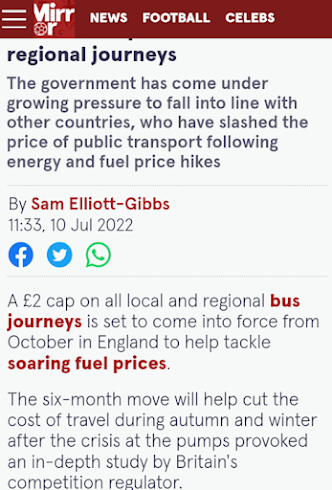
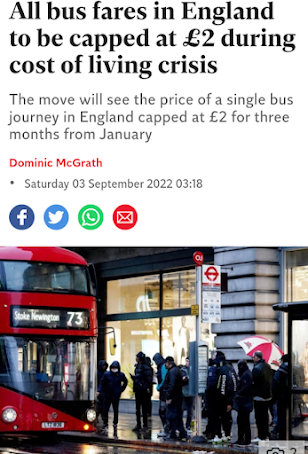
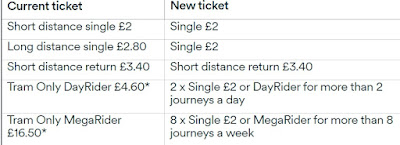
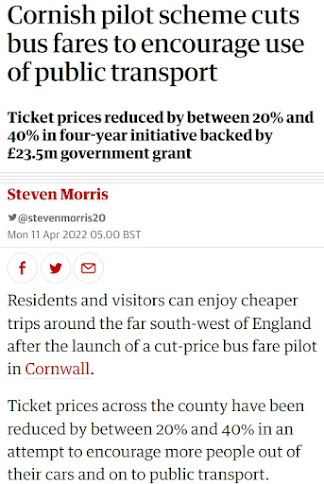
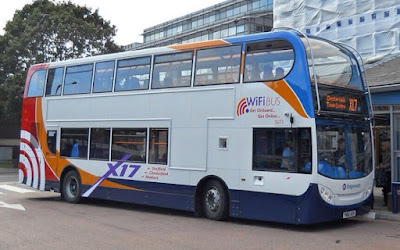







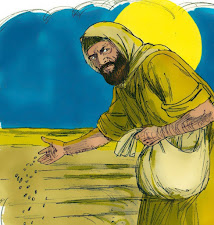


Without naming the operator . . . I believe that they have declined to join the "Cheapo" Scheme because:
ReplyDelete1. DfT have only just issued an "indicative" statement of what reimbursement might be.
2. Their network is relatively small in area, so their maximum fare is not much above £2 single.
3. Their day ticket is above £4, but many passengers purchase a weekly ticket at around £18 which is under £20 (£2+£2x5 days).
4. They have real concerns about what happens at the end of the scheme (supposed to be end of March, but DfT have form in suddenly deciding to extend finishing dates).
5. Based on the current support scheme; they simply don't trust DfT to do what they say they will do.
I suspect there will be many other operators who have looked at the (limited) small print, and said . . . "Nah!".
I believe that the equivalent schemes in Leeds and Manchester are funded differently and more simply as well . . . no results have been seen yet.
And finally . . . fbb's Arfur Daley Bus Company illustration is spot on . . . a percentage reduction in fares has to be balanced by more than the same percentage increase in passengers. This was tried back in the day in several NBC companies . . . it doesn't work unless there is a huge untapped demand by passengers, and outside the conurbations, that simply doesn't exist any more.
This comment has been removed by the author.
DeleteThe answer to the last question is simple - all cross-boundary journeys are in the DfT scheme. The metropolitan schemes end at their respective boundaries, even where they are adjacent.
ReplyDeleteAha . . . thanks, that's logical. So on any through route across the boundary, presumably passengers re-book?
DeleteI do wonder if a straight-forward 25% off all fares above £2, subject to a minimum of £2, might have been more sensible and easier to administer . . . if the fare was £4, it would now be £3, and the operator would be due £1 reimbursement.
Probably too simple for the consultants to justify their huge fees . . . !!
In the areas which already have Fare Capping (e.g. Bristol, Greater Manchester, West Yorkshire and Liverpool City Region all have a £2 maximum single bus fare) this is funded by the relevant BSIP, so these areas are excluded from the nationwide scheme. Cross-boundary services that operate into these areas are eligible though, as are services operating into Greater London.
ReplyDeleteIn all passenger surveys I have ever seen, fares are not high on the priority list.
ReplyDeleteWhat is more relevant is whether there is a bus operating - many people have no evening or Sunday service anyway and so over the holiday period will have no bus for 5 out of 10 days (3 consecutive). Who cares what the fare is, you have to go by taxi (family, friend or commercial).
You then get into routes, times, safety, etc.
What is the position on cross Border routes into Scotland and Wales? Neither devolved government has announced a £2 scheme. I suspect that operators will not be offering it.
ReplyDeleteAvailable on the journey from England, but not to it.
DeleteNote that this ill-thought-out scheme is allegedly to help those who already travel by bus with the cost of living crisis, not to encourage more people to use public transport.
ReplyDeleteWith the amount of non-running, the buses that are, are packed out, so they couldn't cope with more passengers anyway. So I suppose the more passengers giving up, out of frustration, can only help!
DeletePity the driver working for the companies that don’t adopt the £2 fare for the potential aggro from passengers expecting a bargain fare !
ReplyDelete